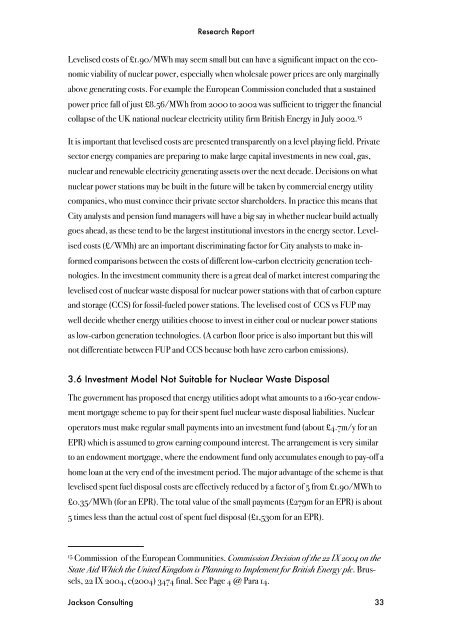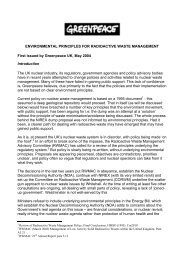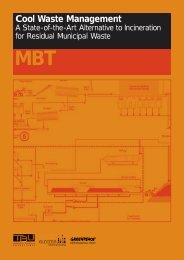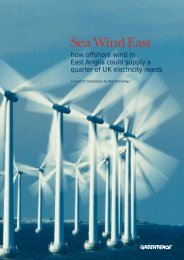fixed unit price simulation for disposal of spent fuel ... - Greenpeace UK
fixed unit price simulation for disposal of spent fuel ... - Greenpeace UK
fixed unit price simulation for disposal of spent fuel ... - Greenpeace UK
You also want an ePaper? Increase the reach of your titles
YUMPU automatically turns print PDFs into web optimized ePapers that Google loves.
Research Report<br />
Levelised costs <strong>of</strong> £1.90/MWh may seem small but can have a significant impact on the economic<br />
viability <strong>of</strong> nuclear power, especially when wholesale power <strong>price</strong>s are only marginally<br />
above generating costs. For example the European Commission concluded that a sustained<br />
power <strong>price</strong> fall <strong>of</strong> just £8.56/MWh from 2000 to 2002 was sufficient to trigger the financial<br />
collapse <strong>of</strong> the <strong>UK</strong> national nuclear electricity utility firm British Energy in July 2002. 15<br />
It is important that levelised costs are presented transparently on a level playing field. Private<br />
sector energy companies are preparing to make large capital investments in new coal, gas,<br />
nuclear and renewable electricity generating assets over the next decade. Decisions on what<br />
nuclear power stations may be built in the future will be taken by commercial energy utility<br />
companies, who must convince their private sector shareholders. In practice this means that<br />
City analysts and pension fund managers will have a big say in whether nuclear build actually<br />
goes ahead, as these tend to be the largest institutional investors in the energy sector. Levelised<br />
costs (£/WMh) are an important discriminating factor <strong>for</strong> City analysts to make in<strong>for</strong>med<br />
comparisons between the costs <strong>of</strong> different low-carbon electricity generation technologies.<br />
In the investment comm<strong>unit</strong>y there is a great deal <strong>of</strong> market interest comparing the<br />
levelised cost <strong>of</strong> nuclear waste <strong>disposal</strong> <strong>for</strong> nuclear power stations with that <strong>of</strong> carbon capture<br />
and storage (CCS) <strong>for</strong> fossil-<strong>fuel</strong>ed power stations. The levelised cost <strong>of</strong> CCS vs FUP may<br />
well decide whether energy utilities choose to invest in either coal or nuclear power stations<br />
as low-carbon generation technologies. (A carbon floor <strong>price</strong> is also important but this will<br />
not differentiate between FUP and CCS because both have zero carbon emissions).<br />
3.6 Investment Model Not Suitable <strong>for</strong> Nuclear Waste Disposal<br />
The government has proposed that energy utilities adopt what amounts to a 160-year endowment<br />
mortgage scheme to pay <strong>for</strong> their <strong>spent</strong> <strong>fuel</strong> nuclear waste <strong>disposal</strong> liabilities. Nuclear<br />
operators must make regular small payments into an investment fund (about £4.7m/y <strong>for</strong> an<br />
EPR) which is assumed to grow earning compound interest. The arrangement is very similar<br />
to an endowment mortgage, where the endowment fund only accumulates enough to pay-<strong>of</strong>f a<br />
home loan at the very end <strong>of</strong> the investment period. The major advantage <strong>of</strong> the scheme is that<br />
levelised <strong>spent</strong> <strong>fuel</strong> <strong>disposal</strong> costs are effectively reduced by a factor <strong>of</strong> 5 from £1.90/MWh to<br />
£0.35/MWh (<strong>for</strong> an EPR). The total value <strong>of</strong> the small payments (£279m <strong>for</strong> an EPR) is about<br />
5 times less than the actual cost <strong>of</strong> <strong>spent</strong> <strong>fuel</strong> <strong>disposal</strong> (£1,530m <strong>for</strong> an EPR).<br />
15<br />
Commission <strong>of</strong> the European Comm<strong>unit</strong>ies. Commission Decision <strong>of</strong> the 22 IX 2004 on the<br />
State Aid Which the United Kingdom is Planning to Implement <strong>for</strong> British Energy plc. Brussels,<br />
22 IX 2004, c(2004) 3474 final. See Page 4 @ Para 14.<br />
Jackson Consulting 33




![[2007] EWHC 311 - Greenpeace UK](https://img.yumpu.com/22079793/1/184x260/2007-ewhc-311-greenpeace-uk.jpg?quality=85)












